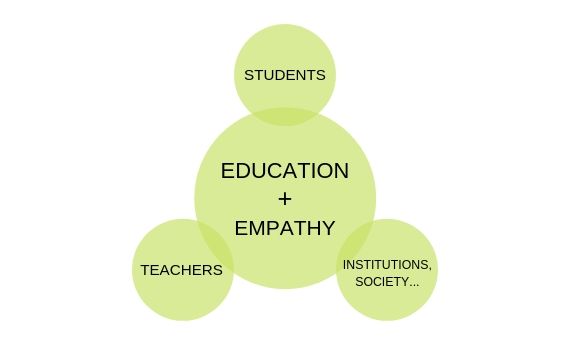Education constitutes one of the fundamental pillars of every society. The way in which knowledge is transmitted is essential to prevent it from becoming mere data points that are disconnected and meaningless.
Active methodologies
The right to education, which is contained in Article 26 of the Universal Declaration of Human Rights, is more than just the right to attend school. As education aims to fully develop an individual’s personaIity, it also entails the right to find in that school everything needed to develop dynamic reasoning and a live moral conscious.
An active methodology provides a space for students to spontaneously search, and allows the knowledge they acquire to be somehow reinvented by the students, or at least rebuilt, but not simply transmitted.

In all stages it is important to foment an education that stimulates research and hard work, and doesn’t settle for transmitting clear-cut unshakeable solutions. In order to do so, as Piaget established, the education field must not generate isolated compartments. Thus, the importance of a cross-cutting education to articulate and connect knowledge, and of educational empathy, because paying attention to what each student does and needs, and listening to what he or she has to say, and their concerns, establishes a better student-teacher relationship so both feel important.
For some neuroscientists like Joseph E. LeDoux, imagining a life without emotions would not be possible because we live thanks to them, even if they are involuntary or we aren’t aware of them. The mind does not just think – it also feels. A mind without emotions would just be a “frozen soul”. But it’s important to keep in mind this nature of overall unawareness of emotion as it relates to cognitive reality as an individual’s behavior depends on the interaction of both spheres, even if they may appear to be different.
Thus, it can be considered that the fundamental principle of an active methodology promotes the idea that understanding is rebuilding through reinvention, or even invention in order to ensure that individuals are capable of producing and creating – not just repeating. Education should be geared toward all stages, toward breaking down barriers, toward opening doors that enable the selection of different combinations throughout the educational process – because knowledge from different areas complements each other and multiplying lessons will also be beneficial for people and societies.
Where to position educational empathy
Knowledge in itself is important and should be treated and transmitted like an emotion. Teachers must be capable of observing, perceiving messages and redirecting their teaching when necessary to reach and get closer to the students, showing them that the act of teaching is not something immutable. Even though our thoughts can flow in very different ways, the important thing is to keep them active and flexible. This is how emotional networks and resources are activated, based on a multifaceted concept of thoughts tied to an admirable property of the brain: its plasticity.

A model or educational paradigm is needed in which the development of these emotional networks and resources is prioritized and promoted to get to know students and motivate them in their path to intellectual and personal growth.
Emotional literacy and pedagogical principles
As human beings we need to understand our personal systems, our internal world, improve our self-awareness. That is why it is also important that learning processes also cater to the reasons we feel what we feel and what to do with those feelings. In other words, teaching to manage our emotions.
In short, it is a question of fostering an optimal comprehensive education that can prepare people appropriately for the future. And without a doubt, comprehensive education includes social, emotional and theoretical learning. Social, emotional and organizational learning and systemic thought must be fomented, but without overlooking the development of skills and abilities as instruments to prosper in new environments. When students get involved in issues that are relevant to their lives, they take responsibility for their own learning. Hence the following aspects are significant:
- Paying attention to the students’ reality and to their process of understanding the world.
- Allowing the students to build their own models and paradigms, and believe in and test their own methodologies to comprehend problems.
- Emphasizing action, how to act and behave; and in thoughts, the ability to reflect.
- Fostering in students the ability to take responsibility for their own learning.
- Creating incentives for group dynamics.
- Being aware and recognizing that teachers not only transmit knowledge and curriculum. They also design, facilitate and make decisions, which requires support and a continuous knowledge acquisition process, as well as the tools needed to do their job.
Learning is an evolutionary force that has allowed humanity, people and organizations to progress. As educational empathy, social learning and comprehension, and systemic thought are reinforced, and are taken into account by more teachers, students, schools and families, the students will be able to build a stronger personality and contribute to the development of societies with values that more closely match the vital needs of individuals.
Dra. Ana González Menéndez
References
- Bisquerra, R., Pérez González, J. C., y García Navarro, E. (2015): Inteligencia emocional en educación. Madrid. Síntesis.
- Camps, V. (2008): Creer en la educación. La asignatura pendiente. Barcelona. Ediciones Península.
- Feito Alonso, R. y López Ruiz, J. I. (coord.) (2008): Construyendo escuelas democráticas. Barcelona. Hipatia editorial.
- García Gual, C., Gomá Lanzón, J., y Savater, F. (2014): Tres visiones y más de la idea de felicidad. Barcelona. Ariel, grupo editorial Planeta.
- Goleman, D. y Senge, P.M. (2016): Triple Focus. Un nuevo acercamiento a la educación. Barcelona. Ediciones B.
- Gompertz, W. (2015): Piensa como un artista. Barcelona. Taurus. Penguin Random House Grupo editorial.
- Maillard, Ch. (2009): Contra el Arte y otras imposturas. Valencia. Pre-textos. Colección Textos y pretextos.
- Manes, F., y Niro, M. (2015): Usar el cerebro. Conocer nuestra mente para vivir mejor. Barcelona. Paidós.
- Marchesi, A. (2007): Sobre el bienestar de los docentes. Madrid. Alianza editorial.
- Marina, J.A. (2016): Objetivo: generar talento. Cómo poner en acción la inteligencia. Barcelona. Penguin Random House grupo editorial.
- Peñalver, C.; Sánchez, S. (2014): Cuentos para educar con inteligencia emocional. Barcelona. Ediciones Beascoa.
- Root-Bernstein, R. y M. (2002): El secreto de la creatividad. Barcelona. Kairós.
Comments on this publication